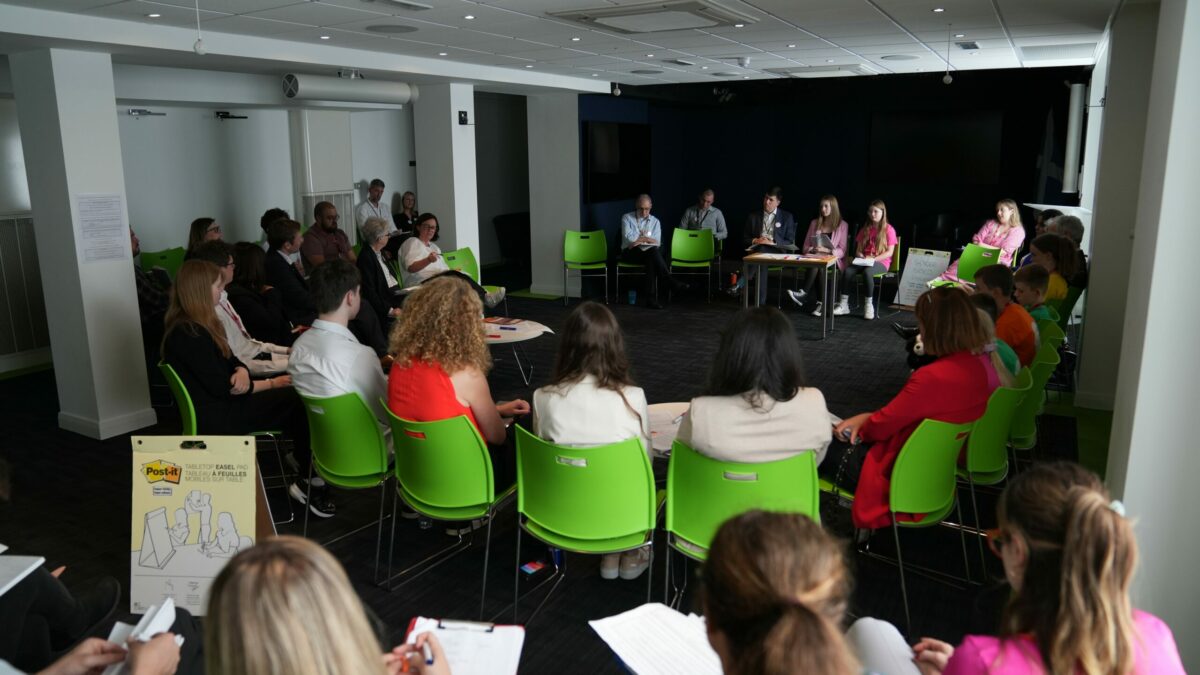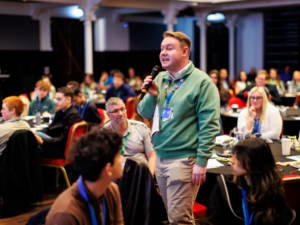At the Annual Children and Young People’s Executive Takeover 2024, Shafa Waqas MSYP and Skye Allan MSYP gave a speech to the Permanent Secretary, Directors-General and other civil servants on ending gender-based violence.
Reflecting on the event, Skye said: “Getting to attend the 2024 Executive Takeover was a brilliant opportunity to discuss issues affecting young people. It was really valuable to discuss tangible improvements which can be made to young lives, especially when they can have such a positive impact and I’m really grateful that I could be a part of that! I hope that young people will have more opportunities to influence policy going forward as it was encouraging to see our feedback being taken on board. We look forward to seeing long term and consistent strategies tackling gender-based violence going forward, as well as more inclusive and intersectional resources to further improve support services.”
Shafa added: “The Executive Takeover was a fantastic opportunity where we got to advocate for young people in a room of people willing to listen and engage which was incredibly motivating to see and be part of. This event helped me understand more in depth the behind the scenes work of policy development and the importance of representation when it comes to decision making to ensure all groups of people feel seen. My biggest hope is that going forward, the Scottish Government staff take forward with them the importance of intersectionality in all areas but specifically it’s significance in gender-based violence work.”
You can read our speech below:
Hello, my name is Shafa Waqas, and I am the MSYP for Cumbernauld and Kilsyth; and my name is Skye Allan, and I am the MSYP for Dumfriesshire. We are to talk to you about ending gender-based violence.
Shafa
UNCRC Article 19: Children have the right to be safe from violence in all the forms that may appear in.
Childhood is a formative time; when the ideas and values we are exposed to take root and grow to form our outlook on life. We may like to think that young people aren’t exposed to the horrific reality of gender-based violence, but the truth is we learn from watching those around us, following in their footsteps for better or worse. Biases and prejudice are built up over time and grow alongside us until scared angry children become scared angry adults.
Gender based violence is aggression and or discrimination targeted at someone based on their perceived gender. This can be but is not limited to: harassment, abusive relationships, coercive control, forced marriages, assault and online violence. This violence is born of gender inequalities. This means that while this issue disproportionately effects women, everyone can be a victim of violence and the repercussions.
There have been many attempts to reduce gender-based violence within schools as a part of the Equally Safe strategy, the most notable being the MVP (Mentors in Violence Protection scheme) and visits from rape crisis in Health and wellbeing classes. Despite these strategies, gender-based violence has seen a huge increase according to the Office for National statistics. In the last year the number of women aged 16+ experiencing harassment on our streets has significantly increased to 50%!
So, why is the estimated £23 Million invested in these services not stopping the rising tide of violence? One reason may be that young people’s experiences of these strategies is inconsistent, sometimes one-off endeavours. Even the MVP strategy doesn’t have regular interventions, and instead focuses on one-off sessions.
Another issue is the focus in schools being on the pupil, rather than the school community itself. We rely on students to be whistleblowers (at the risk of social exclusion, bullying and violence) when many don’t receive the support they need. Girlguiding reports that more than half of young women disagree that sexist remarks are dealt with seriously, which shows that there is no consistent intervention to stop gender-based violence – allowing it to thrive. This may be why 55% of 13–16-year-old girls, report that they have been sexually harassed.
Is there any wonder why gender-based violence persists when it has been repeatedly given the blind eye? Every time we pretend not to hear a comment. Every time we stay silent. Every time we make excuses for gender-based violence; we allow it to exist. By not responding to violence, we signal that these behaviours are socially acceptable, that it is ok to belittle and threaten each other based on gender. The young people of Scotland are calling upon YOU to right this wrong, and to build them a better future together.
Skye
Fortunately, there are passionate young campaigners here to help make that happen. To truly tackle gender-based violence we believe that any approach should meet this checklist for success:
- Intersectionality
- Consistency
- Youth participation
Intersectionality is when people have different characteristics which crossover or ‘intersect’. Different cultures, races, and social groups all experience gender-based violence differently and therefore need different support. Men and women will experience GBV differently, but then women will also experience it differently from each other. For example, a black woman experiences forms of oppression through both sexism and misogyny, and racism. The lack of consideration for these differences is particularly devastating when minority groups are statistically more likely to be victims of gender-based violence. A report from Girlguiding showed that between 2018 and 2023, the number of girls and young women who have experienced some form of violence online has risen from 65% to 81%. And it is minority groups who see the biggest increase in violence directed at them, being almost 2x more likely to experience GBV, particularly on the internet. Minority groups may also feel less safe or able to access support networks due to cultural stigma which makes them vulnerable to social isolation and abuse. A true intersectional approach would mean that all victims are properly supported and allowed to heal.
As Shafa said, one of the biggest issues with current strategies to reduce gender-based violence is that they tend to be inconsistent and one-off interventions. A single lesson will struggle to be memorable, let alone actively challenge students internalised beliefs. To create a long-term impact, we need to target the roots of gender-based violence and consistently chip away at this issue across schools, workplaces, youth work and in public spaces. When you grow plants, you cannot just plant the seeds. You must till the soil, water the plants, repot the sapling. We cannot plant the seeds of change then expect to reap the rewards immediately, we need to continuously and consistently take a stance against gender-based violence.
As a part of a consistent approach, it is important to instil the values of respect and knowledge from a young age. By starting early, we stop the cycle starting over. By focusing on prevention, we provide a long-term solution rather than just a Band-Aid for the symptoms. We need education to be accessible to young people as well as a safe space to have these discussions. To make a system that works we need to work with young people, of all genders; to empower them with the tools they need to combat gender-based violence.
Gender based violence is not a new issue, and it is easy to feel small against the centuries of discrimination that gives inequality strength. But if inequality can spread, so too can equality. Every person who stands up, who says no to violence, makes our community that little bit safer. We ask you to lend us your voice, and when you take a step, to step forward.


